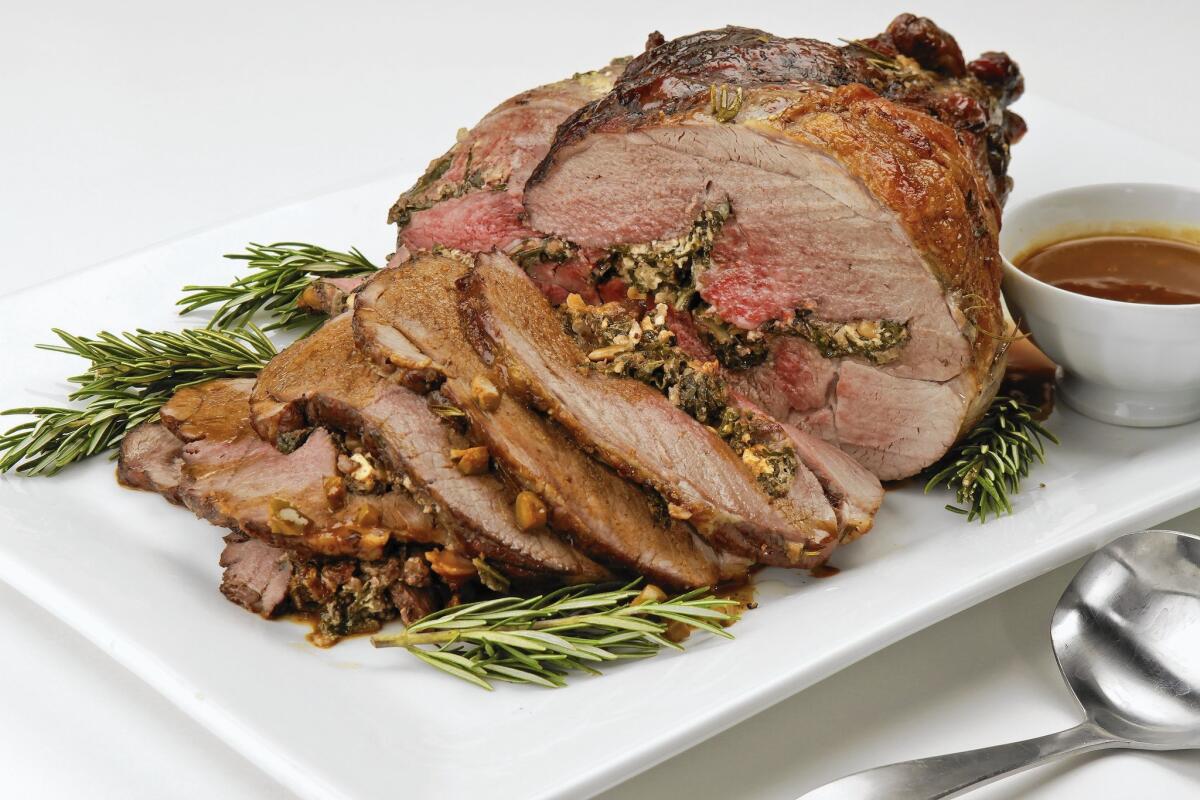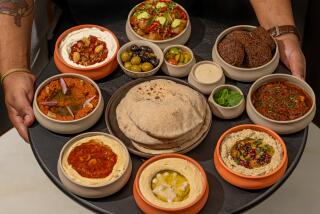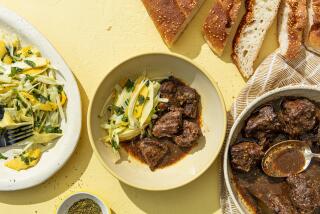Leg of lamb: Impressive — and impressively easy

Want to become a great cook almost instantly, with hardly any work? Buy a leg of lamb. There are few things that are as easy to prepare and as impressive. Season with salt and pepper, roast at 325 degrees to a rosy medium-rare and then watch your friends drool while you carve.
Even setting aside all the Easter metaphors, lamb is special. It’s got a rich, almost gamy quality that lends itself to all sorts of big flavors.
For example, for my go-to leg of lamb, I cut little slits all over the surface and insert slips of garlic, rosemary and salted anchovy to perfume the meat while it cooks. It’s a bit time-consuming, but after an hour or so in the oven, when the garlic, rosemary and umami-rich anchovy have melted into the meat …. Oh, my. And if you want to make this more easily, you can grind those ingredients with olive oil into a paste and simply rub it on the surface.
The biggest thing you have to worry about when roasting a leg of lamb is doneness. We’ve been conditioned to equate rare meat with culinary sophistication, but while this may arguably be true when you’re talking about a steak, it’s definitely not right for a leg of lamb.
Loin muscles, which run lengthwise along the spine, get very little work and so are naturally tender. Lamb’s legs are very active, and the meat is full of connective tissue. This needs to be cooked to a higher temperature to soften and become palatable. Cook a leg of lamb too little and you’ll wind up with stringy meat.
More is not better, of course. In fact, there are probably more sins committed against lamb at the opposite end of the doneness spectrum. Some cooks who are unfamiliar with lamb seem to be trying to punish it by incineration. Like any other meat, lamb will dry out and become tough if overcooked.
I find that pulling the leg from the oven at an internal temperature of about 130 to 135 degrees is just about perfect. After a 30-minute rest before carving, the meat will still be pink and juicy but firm, and the connective tissue will have softened.
This basic method can be tweaked in many directions. You can do the anchovies-garlic-rosemary thing, of course. You can serve your leg with a black olive tapenade or marinate it in an Indian-influenced paste of yogurt and ginger.
A leg of lamb even works well pot-roasted. In fact, one of my favorite lamb dishes is based on a Patricia Wells recipe that calls for baking it in a sealed Dutch oven at 425 degrees for up to six hours. (Sounds impossible? Try it and see.)
Grilling, of course, works great, particularly with “butterflied” legs of lamb, which have had the bones removed. In fact, most of the legs you’ll find in markets these days have been butterflied. This has its advantages, because with a little nipping and tucking these will lie flat on the grill.
A butterflied leg of lamb also offers the opportunity for a greater range of donenesses (the meat is not of an even thickness, so you’ll get thick parts that are medium-rare and thinner parts that are more medium). And buying a boned leg also allows you to remove some of the interior pockets of fat, which will tame the wild flavor a bit for eaters who are not naturally lamb lovers.
But I still think a bone-in leg is worth looking for. The meat seems to me to be a little juicier — and it certainly makes a more impressive appearance at the table.
No matter which leg you buy, don’t feel obliged to tell anyone how easy cooking it really is.
::
Seven favorite leg of lamb recipes
A basic roast leg of lamb is one of the best things you can cook. But with a little more effort, you can make something really special. Here are seven of my favorite lamb dishes, for both bone-in and butterflied legs, cooked in the oven or on the grill, and even a couple of pot roasts. For full recipes for any of these dishes, search our California Cookbook recipe collection online (recipes.latimes.com).
Roast leg of lamb with rosemary, garlic and anchovies: Cut thin slits all over the surface of a bone-in leg. Insert a thin slice of garlic, a tuft of rosemary and a smidge of salted anchovy into each slit. Rub with olive oil and roast.
Leg of lamb stuffed with greens, feta and pine nuts: Combine braised cooking greens, crumbled feta and toasted pine nuts, and use this to stuff a boneless leg. Roll and tie the leg, rub with olive oil and roast. Before serving, make a pan sauce with red wine, rosemary and chopped green olives.
Pot-roasted lamb with fennel and potatoes: Sear a tied boneless leg in a Dutch oven. Cook onion and garlic, then add quartered fennel bulbs and small potatoes. Pour over white wine, return the leg to the pot, cover and cook.
Easter: Recipes, egg decorating tips, L.A. brunch restaurants and more >>
Lamb and lentils to eat with a spoon: Brown onions, carrots, garlic and a bone-in leg in a Dutch oven in a 425-degree oven. Add water, tomato paste and red wine, cover tightly and roast 5½ to 6 hours. Add cooked lentils and finish with minced herbs.
Lamb marinated in yogurt, garlic and rosemary: Slather a boneless leg with a paste made from garlic, rosemary, olive oil and salt. Put it in a plastic bag and add yogurt. Rub well and refrigerate overnight. Great on the grill; really good in the oven.
Indian-spiced grilled lamb: Stir together yogurt, red wine vinegar, garlic, black pepper, grated ginger, sliced serrano chile, ground cumin and salt. Put a boneless leg in a plastic bag and pour the marinade over. Refrigerate overnight. Perfect for grill or oven.
Grilled butterflied leg of lamb with olive-fennel tapenade: Thinly slice garlic and insert in thin slits cut in the skin side of a boneless leg. Season with salt and pepper, put in a plastic bag and pour over red wine. Refrigerate two to three hours before grilling or roasting. Make a tapenade to serve alongside by grinding together pitted brined black olives, minced garlic, fennel seed, red wine vinegar, olive oil, Pernod and minced parsley.
More to Read
Eat your way across L.A.
Get our weekly Tasting Notes newsletter for reviews, news and more.
You may occasionally receive promotional content from the Los Angeles Times.










